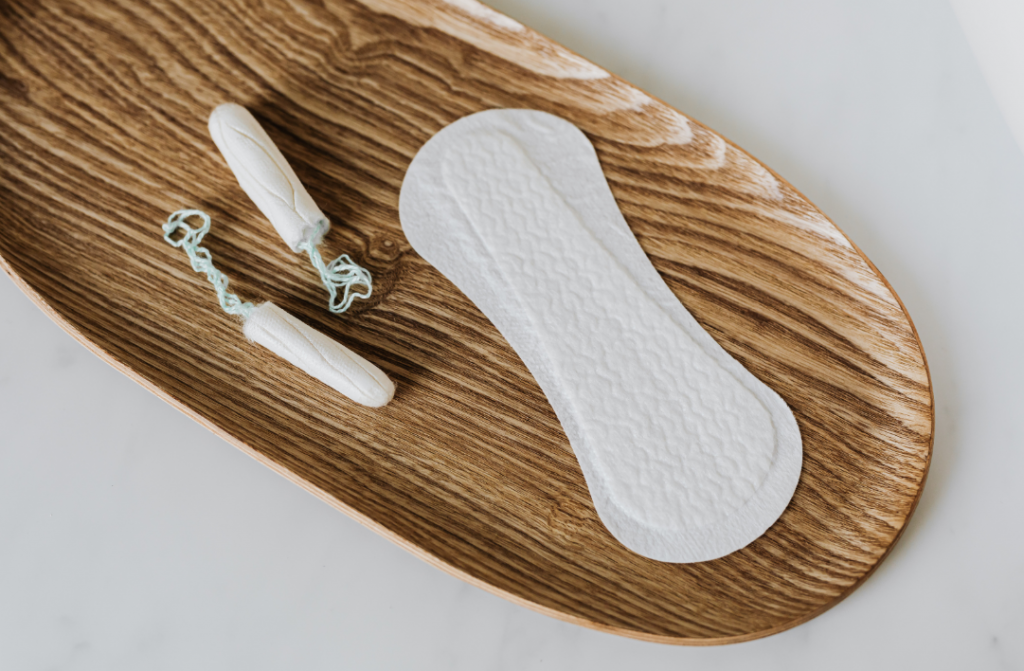Menstruation (also know as a ‘period’) refers to the monthly vaginal bleeding that happens (usually) every month as part of a normal menstrual cycle.
During a regular menstrual cycle, hormones from the ovary trigger endometrial tissue to grow within the uterus. This tissue lines the womb, preparing it for ovulation and potential pregnancy. If no pregnancy occurs in that cycle hormones levels will decrease and the endometrial tissue is shed, causing a period.
Most people with a uterus will have their first period between the ages of 10 and 16. It’s normal to have irregular periods at first, but by about three years most people will fall into a regular cycle. The average length of a menstrual cycle is about 28 days, however this varies between person to person. Menopause, when you no longer have a menstrual cycle, often occurs around the age of 45-55 years.
Managing Periods
There are a few different products to help absorb the flow of your period.

Disposable options include pads and tampons. There are also a range of reusable products, including menstrual cups, period underwear and reusable pads. Different products may suit you better depending on the heavieness of your period and where you are in your cycle.
Contraception (birth control) can be used to manage periods. Family Planning has information on both period products and contraception.
If you need help accessing period products in Aoeteroa New Zealand you can contact The Period Place.
Hymens, virginity and period products
There is a cultural myth that tampons cannot be used by virgins, or that using tampons will break the hymen (‘pop the cherry’). In fact, hymens can not be ‘popped’ or broken. These beliefs come from misinformation about hymens and virginity. Virginity is a cultural concept, not a physical state. Therefore, you can’t tell whether someone is a virgin by the appearance of their hymen and the use of period products does not affect your virginity. It’s important to use whichever period products make you feel most comfortable.
Menstrual Problems
It’s common to feel some discomfort related to your cycle. People often report;
- Abdominal and/or pelvic cramps
- Bloating
- Tender/sore breasts
- Pain in the lower back
- Food cravings
- Mood swings
- Headaches/tiredness
If you are experiencing significant discomfort, bleeding between periods, missed periods, or your cycle has changed (particularly if you begin bleeding heavier or more frequently) it’s a good idea to visit a doctor.
There are a few different conditions, including PCOS, endometriosis, fibroids or other underlying medical concerns that can cause abnormal bleeding.
Premenstrual syndrome (PMS)
PMS is a group of physical and mental symptoms that may be experienced before a menstural cycle each month. The cause of PMS is not yet known, however it is estimated 40% of menstruators experience symptoms. For some people, these symptoms can be severe enough to disrupt daily activities.
“Common symptoms of PMS include;
- moodiness
- irritability
- tension
- crying easily
- headache
- confusion
- sore breasts
- depression
- constipation or diarrhoea
- feeling bloated (retaining water)
- backache
- being clumsy.
Less common symtoms include;
- sleep disturbances
- food cravings
- skin problems such as pimples
- joint pain
- hot flushes
- mild to severe personality changes
- feeling hostile towards others
- irregular heartbeat and palpitations
- feeling indecisive
- those who have asthma sometimes find it gets worse at this time”.
- Source: Health Navigator
Self Care
It’s normal to feel like you need a little more rest and comfort during your period. There are lots of ways to practice self care during your period;
- Cramps can be alleviated by using a hot water bottle, a relaxing bath, or taking over-the-counter pain medications (research suggests ibuprofen is most useful).
- Exercise can help manage symptoms. If you have less energy than normal opt for a low-impact workout like walking or yoga.
- Supplements like magensium, evening primrose oil and chasteberry are commonly used for PMS. Consult with your doctor before trying supplements (particuarly for chasteberry as it interacts with certain medications, including birth control pills).
- Have an orgasm! The contraction and release of the uterus during a vaginal orgasm may help alleviate cramps. The endorphins released during sex and masturbation can also take your mind off cramps.
- Birth control isn’t just for preventing pregnancy. Certain birth controls can provide relief from cramps and PMS.
- It’s important to nurture your mental health. Be gentle on yourself, practice good sleep hygiene and incorporate self care routines.
- Dietary changes can help. Try eating small meals often, upping your intake of complex carbs (brown rice, pasta, bread etc) and limiting caffeine, salt, alcohol and smoking.
Useful Links
The Period Place » a charity that aims to provide safe spaces for period conversations, get period education to those that need it, and ensure every menstruator in Aotearoa has the same access to period products.
Dignity NZ » Dignity provides access to sanitary items in work and at school. Dignity uses a ‘buy one, give one’ approach so that companies can provide sanitary items not only to their staff, but also to those who are without access to pads and tampons, causing them to miss out on education, life and work.
‘It’s not a cherry and it can’t be popped’ » article by The Spinoff about the hymen myth.
‘Decolonise your body! The fascinating history of Māori and periods’ » interesting article from The Spinoff exploring traditional Māori attitudes to menstruation.
References
Ministry of Health » Abnormal Menstrual Bleeding
Health Navigator » Menstruation
Family Planning » Periods